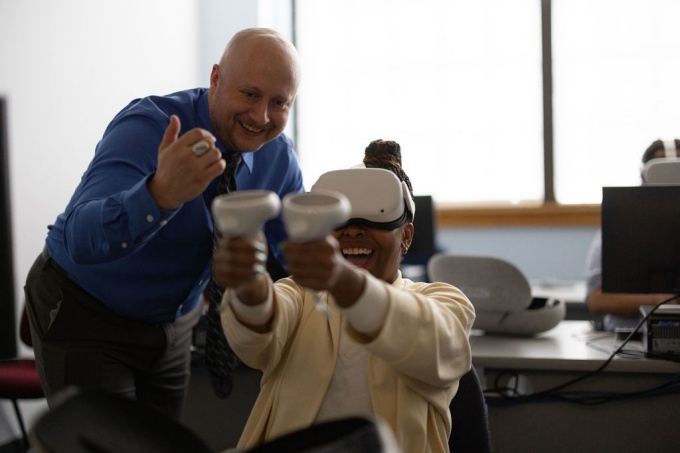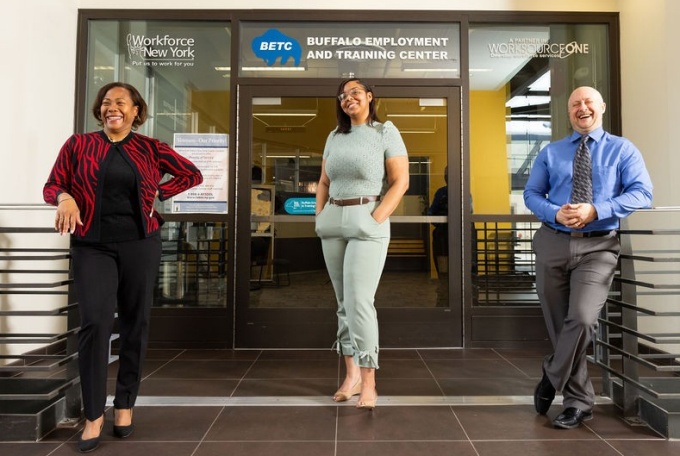Ripple effects
How an MSW student and his field agency are carving a new path for hands-on training

Patrick Rosenberger works with Dylana Thompson, youth career navigator at BETC, on a virtual reality simulation. Photos: Stephen Gabris
By Catherine Donnelly
Patrick Rosenberger, MSW ’25, completed the first social work field placement at the Buffalo Employment and Training Center (BETC) since the site refreshed its internship program under new leadership.
BETC is a comprehensive career center funded by the federal Workforce Innovation and Opportunity Act and managed by Workforce Buffalo. Dixie Farr, MSW ’14, joined as deputy director in 2022 and was soon followed by the addition of Jacqueline Hall, DSW ’24, MSW ’05, as executive director. Farr and Hall worked together to develop a field experience that offers a structured and supportive learning environment for students.
“When I was contemplating my active-duty time in the military, I realized that the highlights of my career involved helping people,” says Rosenberger. “I started job searching at the tail end of my most recent National Guard mobilization and discovered that there were several open social worker positions at the Buffalo VA. Social work appeared to offer a chance to not only help people in general, but especially my fellow veterans.”
Rosenberger’s timing was serendipitous. When he started classes at UB, the BETC had finally relaunched its internship program, and he was matched with the organization.
As part of his field experience, Rosenberger helped to expand BETC’s services for individuals seeking to enter the workforce or advance in their career.
“The BETC specializes in providing innovative experiences, like virtual reality career exploration, ongoing employer engagement opportunities and access to grants,” says Farr. “We are challenging the way workforce development has been done locally, with a goal to prepare the future workforce by building out programming that focuses on youth, justice-impacted individuals and veterans. Patrick has been especially helpful with his firsthand knowledge of serving in the military.”
Farr specifically encouraged Rosenberger to focus on self-care activities with BETC staff. Since the center is the linchpin between employers and job seekers, she says the team must maintain high energy to be the resource the region needs.
“When I was a student, my field experiences were more focused on clinical social work, and I graduated without a clear sense of the kind of social worker I would become. I didn’t know workforce development was a lane, I didn’t know that my strengths were in macro-level work and advocacy, and I didn’t understand the importance of self-care,” continues Farr. “I am dedicated to making sure the next generation of social work students are prepared for the real work world.”
Hall agrees that a meaningful field experience for her students is a priority. Originally drawn to social work due to her passion for community involvement and belief in the power of systemic change, she continues to promote the importance of lifelong learning by completing her Doctor of Social Work degree at UB.
“I recognized that obtaining my DSW would not only deepen my understanding of the complexities within the field, but also equip me with the advanced knowledge and skills needed to drive innovation, lead initiatives and advocate for systemic change,” says Hall. “Social workers are uniquely positioned to address systemic challenges by advocating for policy changes that promote equity, justice and inclusivity.”

From left: Jacqueline Hall, MSW ’05, DSW ’24; Dixie Farr, MSW ’14; and Patrick Rosenberger, MSW ’25.
— Patrick Rosenberger, MSW ’25
The BETC enrolls over 130 clients and supports over 500 visits each month. The team is dedicated to helping unique groups manage their own challenges.
“Each person we help makes a change someplace else, like in their family or in themselves. Our work causes ripples that we may not always see,” says Farr. “It is our job to find the commonalities and help
people who are marginalized. Employers may stay away from individuals they don’t know, so we are here to make those introductions.”
Rosenberger appreciates how his BETC experience has helped him understand more about using a trauma-informed approach to social work and assisting clients to manage any roadblocks they encounter. He especially enjoyed the virtual reality workforce training suite of exercises that simulate real-life job situations.
“The VR program can guide users through real-world tasks, such as how to use tools like a mechanic, engage with a customer or stack boxes,” he says. “Currently we use this with our youth clients, but eventually the BETC would like all customers to be able to use the system because it is incredibly valuable in managing choice paralysis.
“I’ve learned that there is no single approach to helping someone. Taking the time to understand your client is critical,” Rosenberger continues. “For instance, a veteran may not understand how their skills from deployment can contribute to a more traditional job setting, while a justice-impacted individual might be able to start some skills training at a correctional facility and be ready for more advanced assistance when they arrive at BETC.”
Rosenberger says his long-term plan is to serve the veteran community in some capacity after graduation.
“I don’t know if I will follow Jackie with earning another degree,” he says, “but I have discovered a love for macro-level social work and will look for ways to continue to impact more people wherever I can.”